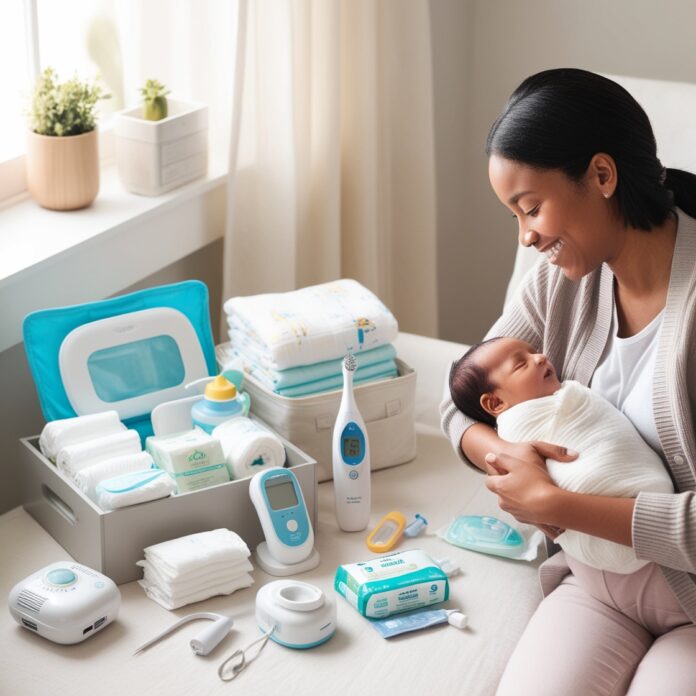Bringing your new baby home is one of the greatest pleasures in life—but it also marks the beginning of a new and sometimes intimidating challenge: keeping your infant healthy and secure. From sleeping safely to bathroom routines, there are just too many things to consider. This guide breaks down the essentials new parents need to know to keep and care for their baby in the first months of life.
1. Safe Sleep Practices
Establishing healthy sleeping habits can significantly reduce the chances of SIDS and other dangers of sleep.
Safer Sleep Tips:
- Back to Sleep: Always place your baby on his or her back for naps and at night.
- Firm, Flat Surface: Use a safety-approved crib or bassinet with a firm mattress and snug-fitting sheet.
- Crib Safety: Don’t add anything to the crib except a firm mattress and sheet.

- Room Sharing: Room share (but not in the same bed) with your baby for at least the first 6 months.
All of these precautions are easy to accomplish, but can save your baby’s life.
2. Car Safety Essentials
The first car ride home for your baby is its welcome to the world, and it needs to be a safe one.

Car Safety Tips
- Use a Rear-Facing Car Seat: Install a rear-facing seat in the backseat of your car and never in the front where airbags release.
- Installation Matters: Follow the instruction manual or have it taken to a certified technician to get it installed correctly.
- Keep it Rear-Facing: Leave your child rear-facing until they exceed the seat’s maximum weight/height limit.
Car crashes are among the leading causes of baby injury—car seat safety isn’t optional; it’s obligatory.
3. Home Safety Essentials
Before your baby even knows how to crawl, start baby-proofing your home. Better safe than sorry.
What to Baby-Proof:
- Outlets and Cabinets: Place safety plugs and latches to prevent electrical injury or poisoning.
- Anchor Furniture: Anchor bookshelves, TVs, and dressers to walls to prevent tipping.
- No Small Objects: Store out-of-sight choking objects like coins, batteries, and toys from older kids.
A secure world permits fearless discovery as your infant matures.

4. Healthcare and Wellness
Scheduled pediatric checkups are imperative through the first year. Your infant’s immune system is continuing to develop, so early visits are vital.
Must-Haves for Health Care:
- Well-Baby Visits: Regular checkups enable the tracking of milestones and early treatment when needed.
- Vaccinations: Follow the recommended schedule of immunizations to protect against preventable illness.
- Emergency Awareness: Be aware of fever, dehydration, or trouble breathing—and when to seek medical assistance.
Parents also need to keep a paper or electronic health record to track vaccines and developmental milestones.
5. Feeding and Nutrition
Breast or formula feeding, proper nutrition fosters healthy development.
Feeding Tips:
- Breastfeeding: Offers ideal nutrition and antibodies to enhance immunity. Feed every 2-3 hours initially.
- Formula Feeding: Choose an iron-fortified formula and mix as instructed in a careful manner.
- Burping and Positioning: Avoid gas and spit-up by burping the baby and keeping them upright after feeding.
Avoid giving your newborn water or solids prior to 4–6 months unless directed by your pediatrician.
6. Hygiene and Diapering
Hygiene avoids infection in your newborn, and comfort promotes better sleep and mood.
Basic Hygiene Practices
- Hand Washing: Wash your hands always before touching your baby, especially after diaper changing or being outside.
- Bathing: Offer sponge baths until the umbilical stump disappears. 2–3 baths a week then are enough.
- Diaper Routine: Change diapers often and use barrier creams to prevent rashes.
Purchase fragrance-free wipes and gentle baby soaps for sensitive skin.
7. Emotional Bonding and Comfort
A secure attachment gives your baby a feeling of safety and being loved, which lays the groundwork for mind and emotional development.
How to Bond:
- Skin-to-Skin: Enhances bonding, regulates body heat, and even helps with breastfeeding.
- Talk and Sing: Your voice is music to their ears—whether they understand the words or not.
- Soothing Strategies: Swaddling, rocking, white noise, and pacifiers all may have a soothing effect on a fussy baby.
Responsive timing to your baby’s needs builds trust and emotional resilience.

8. Managing Visitors and Germ Exposure
In the early days, it’s okay to be selective about who visits your baby—and under what conditions.
Visitor Guidelines:
- Limit Early Visits: Especially during flu season or outbreaks.
- Hand Hygiene: Ask visitors to wash hands before holding the baby.
- Stay Home if Sick: Encourage anyone feeling unwell to visit at another time.
Your newborn’s immune system is not ready to battle common viruses, so precautions matter.
9. Emergency Preparedness
Emergencies happen when you least expect them. A little preparation goes a long way.
Be Ready:
- Learn Infant CPR: Look for classes online or at your local hospital.
- First Aid Kit: Include a thermometer, nasal aspirator, baby-safe pain reliever, and bandages.
- Important Contacts: Keep your pediatrician’s number, poison control, and emergency contacts handy.
Being prepared keeps you calm and responds quickly when it matters.
10. Trust Your Instincts
While books and blogs are useful, your intuition is strong. If something seems off, don’t be afraid to get help.
Final Thoughts:
- Ask Questions: There is no such thing as a dumb question about your baby.
- Build a Support System: Connect with a parenting group or discuss your situation with close family and friends.
- Practice Self-Care: An rested, emotionally supported parent will be better equipped to care for their baby



